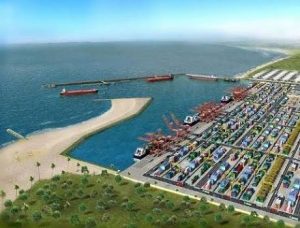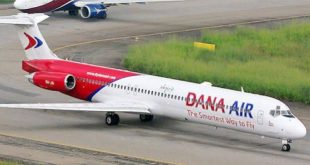
* NPA Boss confirms divestment in Lekki port
The proposed Bakassi Deep Seaport may have been dropped from the port development master plan by the Federal Government because the promoters have not been able to establish its viability. This is coming as the Nigerian Ports Authority(NPA) has confirmed government’s readiness to divest some of its equity holding from the Lekki Deep Sea Port.

The Director General of Infrastructure Concession and Regulatory Commission(ICRC),Dr. Aminu Diko has said that the Commission would not approve the Bakassi Deep Seaport if the promoters do not prove its viability, adding that they had not done it as at the time the government approved only 3 deep sea ports in the country.
MMS plus also gathered that the Cross River State Government may not get the approval after all because the location is considered unviable with technical sedimentary limitation, which has remained the main challenge with the existing Calabar Port channel.

Asked why the Federal Ministry of Transport(FMOT) allowed the Cross River State Government to go ahead with the advertorial on “Expression of Interest” when they had concluded their viability appraisal, the Director of Procurement in the FMOT, Mr. Shehu Aliyu, said the action was informed by the government’s policy of promoting the establishment of many ports as possible to help decongest the Lagos port.

Recently, however, the Governor of Cross River State, Prof. Ben Ayade, had stated the reason for the proposed Bakassi Deep Seaport, saying: “ it is actually not a port that will be competing with the existing Calabar Port of Nigerian Ports Authority. It is strategic in the region because it has 16 meters draught and located in a sensitive location with support coming from the Far East”.
He said port had attracted 100 Chinese firms that are ready to come and establish bonded warehouses, start construction and manufacturing.
He added that the people of Cross River State have emotional attachment to the deep sea port because they are “a people who by no fault of theirs have become refugees in their own ancestral homes, the people who have been denied all rights that nature gives to humanity. So, Bakassi Deep Seaport is to provide an economic base for them and President Buhari is at the forefront of pushing for the realization of the seaport in Bakassi.
The Governor disclosed that they had secured some Mexican partners who were ready to develop a vast Banana plantation, saying “There is no way we can evacuate these bananas to Europe unless we have a functional inland water ways that can support it, so I see a synergy between the Calabar port and the Bakassi Deep Sea port”.
But an expert, who spoke with MMS Plus on the project said,”the federal government recognized that we did not have sufficient capacity in the existing ports, so they opened up and allowed the private sector as well as state governments to attempt to develop ports. Out of these developments, three have been cited in the ports master-plan; Ibom Deep Seaport, AP Mollar Port Badagry and the Lekki port.”
“I’m very pleased that our port is in the master-plan and so we concentrate on its development. Our strategy is not to de-market any other port development let alone that of Cross River which is a sister state. We are not de-marketing them and this is because the bidding and commercial attractiveness of our project does not depend on the advancement of the port project in Cross River State. “Again, we would have been worried if the Federal Government was investing in any of these ports but we now know that they are going to be funded by the private sector. Any private person who wants to engage in port development would look very well at the economic and commercial viability of the project before they invest. We know the story of the Calabar port that the site of the port was not driven by commercial exigency. The original plan was for the port to be sited somewhere else. It was the Federal Government that sited the port so it did not put the commercial aspect, engineering and environmental issues into consideration. Remember we showed you on the distance between the two ports in one of the slides, one has a significant advantage by virtue of its location, while the other one does not.
The source continued:“The one of Bakkasi is up the Cross River upstream and the same development we have in the Calabar port would also be there. The sediments from the study that we had as one of the reasons the ports was moved from its original location. When we studied, we found out that the current has a degree of sediment in that part of the Cross River. It was so much that it would be very difficult to maintain the cost of dredging. I am talking about the capital and maintenance dredging. The plan was that it would be the second river ports in Cross River State. It cannot be a deep sea port for the simple reason which is that the Cross River State does not have access to the sea. After the decision of ceding Bakkasi to Cameroon, the whole region is part of Cameroon and not Cross River state anymore.”
The source added, “so, the proposed location of the Bakkasi port is by the river and the distance from there to the deep sea is not the 16km that we are talking about, but about 80km. You have to factor the cost of taking your vessel there and very importantly, the international customary law on freedom of the sea when innocent passage is guaranteed in any shipping interest it does not apply to rivers or coastal wasters but seas, oceans and international waters. So the innocent passage is not guaranteed here and you have to take permission from Cameroon and if there is a problem of competition because Cameroon is trying to develop its own port, the investor who is going to Cross River would not be able to because we don’t have that universal passage law. These are some of the technicalities. From the policy part of it, I would write to the Federal Ministry of Transportation that we have a good advantage”.
Meanwhile, the Managing Director of NPA, Ms Hadiza Bala- Usman has confirmed that the organization is planning to scale down the level of the 20 per cent shareholding it has in the Lekki Deep Seaport Project.
She stated this in Lagos during a media meeting to mark her 100 days in office, saying that the current management of NPA considers its level of equity in the project to be too high .
Usman said that the organisation had already paid 4.4 per cent of its level of equity in the project, adding that she was sure that the deep seaport would not suffer funding issue because of NPA’s decision to slash its shareholding in it
The NPA Managing Director did not mention the ratio of reduction to be effected in the shareholding, how much the 20 per cent equity amounted to, the sum the 4.4 per cent that has been paid represented , she however disclosed that the authority is discussing with the Transportation Ministry for it to approve
Investigation however revealed that The deep seaport is a $1.5 billion public private partnership project involving the Federal Government represented by NPA , the Lagos State Government and the Tolaram Group, a Singaporean investor which is promoting it . A Shareholder’s Agreement to this effect was signed in December 2012 amongst all three parties.
MMS Plus also understood that the 20 per cent stake of the NPA in the project represented about $118 million while the 4.4 per cent the Managing Director stated has been paid amounted to about $5million.
Usman explained that the NPA has so many projects in which she needed to invest so much money, saying that the prevailing economic situation would not allow the body to want to invest so much money in such a project despite that it was a laudable one.
According to her , the amount that would be realized from the cut in the investment in the deep seaport would afford the NPA the opportunity to use the money in other areas of its operations meant for the development of the Nigerian seaports.
The past management of the NPA had taken up its current level of equity in the multi-billion naira project due to its belief that it will to create thousands of jobs and significantly reduce the present congestion in Nigerian premier port, Apapa Quay, Lagos.
The project is also expected to be an eye-opener that will attract other investors as well as inspire the construction of other proposed deep seaports, like the Badagry deep seaport, Olokonla port in Ogun state, Ogidigben port in Delta state, and the Ibom deep seaport in Akwa Ibom State , lead to economic growth to the country and serve as a hub of West and Central Africa.
The Minister of Transport, Rt. Hon. Rotimi Amaechi, had told MMS Plus in Accra, Ghana earlier that the Federal Government would divest its 20 per cent stake from the Lekki Deep Sea port so as to create a level playing –field for all the competing deep sea ports in the country, a development that pushed the Ibaka Deep Sea Port promoters to restructure the project equity holding structure to 80 per cent and 20 percent, for private sector and Akwa Ibom State, respectively.
 MMS PLUS NG – Maritime, Aviation, Business, Oil and Gas News Online Newspaper with coverage in Maritime, Oil and Gas, Aviation, Power and Energy as well as Financial News
MMS PLUS NG – Maritime, Aviation, Business, Oil and Gas News Online Newspaper with coverage in Maritime, Oil and Gas, Aviation, Power and Energy as well as Financial News









